French singer and actor Serge Reggiani (1922-2004) had his breakthrough in Marcel Carné’s Les portes de la nuit / The Doors of the Night (1946). Reggiani went on to perform in 80 films, including Le Doulos (1962) and Il Gattopardo / The Leopard (1963). In the 1960s, he began a second career as a singer of chansons.

French postcard by S.E.R.P., Paris, no. 198. Photo: Studio Harcourt.

French postcard by A.N., Paris, no. 1293. Photo: Raymond Voinquel.
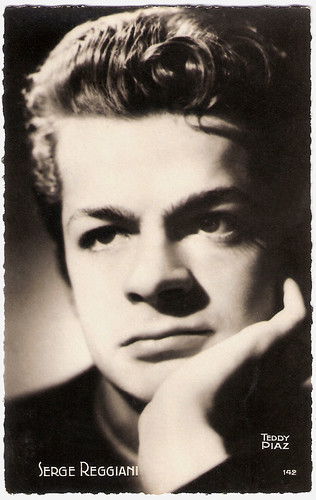
French postcard by Editions O.P., Paris, no. 142. Photo: Teddy Piaz.
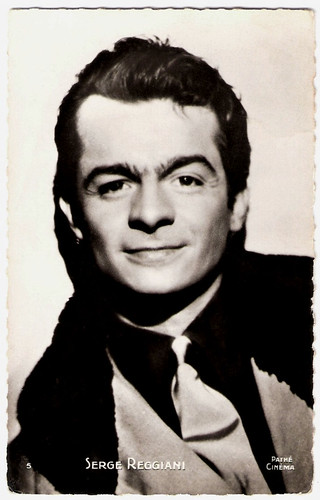
French postcard by Editions P.I., Paris, no. 5, presented by Biscuits Chocolats Victoria, Bruxelles. Photo: Pathé Cinema.
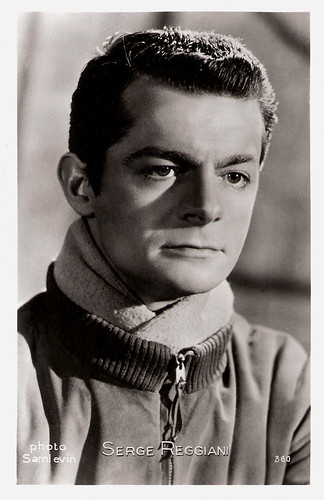
French postcard by Editions P.I., Paris, no. 360. Photo: Sam Lévin.
Sergio Reggiani was born in Reggio Emilia, a town in northern Italy, in 1922. His father, a highly visible anti-fascist, fled his Mussolini-dictated homeland due to his fervent political activities and to protect his family. Serge moved to France with his parents at the age of eight. He learned to speak fluent French and developed an interest in athletics, particularly boxing, but went an entirely different route altogether by following in his father's footsteps as a hair stylist.
In 1937, Reggiani's career path changed yet again when he was accepted into the Conservatoire des Arts Cinematographiques. After graduation, he landed a few minor roles in both films and theatre and enrolled at the prestigious Conservatoire National d'Art Dramatique in 1939, where he won several acting awards. He was discovered by Jean Cocteau and appeared in a wartime production of 'Les Parents terribles' (The Terrible Parents). In the cinema, he made a remarkable debut in Voyageur De La Toussaint / Traveller of The Toussaint (Louis Daquin, 1943) with Jean Desailly. His next film was Le carrefour des enfants perdus / Children of Chaos (Léo Joannon, 1944).
DB Dumonteil writes at IMDb: “The movie was another Serge Reggiani's tour de force after his brilliant debut in Daquin's Voyageur De La Toussaint. Even if Feuillade's Wunderkind René Dary is the star of the film - and he is quite effective as a demobilised officer (and an ex-boarder of Belle Ile) -, Reggiani steals every scene. He is predating the rebels without a cause who would appear in the American cinema of the fifties. His not-so-good-looking face, his sunken features in spite of his young age, his rebellious swagger made him the revelation of those dark years, because he looked the part so much.”
During the filming of Le carrefour des enfants perdus, he met and subsequently married actress Janine Darcey. They had two children: Stephan (1946) and Carine (1951). During World War II, he left Paris to join the French resistance. Though he earned a reputation for himself in the Paris theatre world, Reggiani was more interested in filmmaking and would thereafter focus his attention on the big screen.
He starred in the classic Les portes de la nuit / The Gates of the Night (Marcel Carné, 1946). After obtaining French citizenship in 1948, he went on to secure a name for himself in the French cinema with roles in Manon (Henri-Georges Clouzot, 1949) with Cécile Aubry, Les amants de Vérone / The Lovers of Verona (André Cayatte, 1949) opposite Anouk Aimée, La ronde (Max Ophüls, 1950) and Casque d'or (Jacques Becker, 1952) featuring Simone Signoret, who became a close friend. Following his divorce from Janine Darcey, he married actress Annie Noël in 1958, and they had three children: Celia (1958), Simon (1961) and Maria (1963).
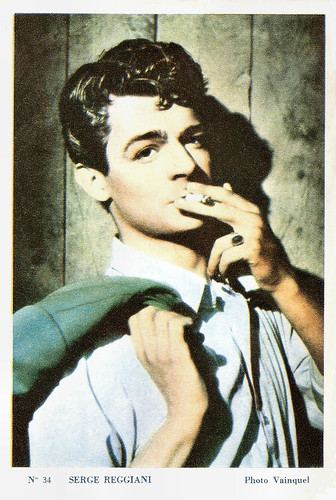
Belgian collector card by Merbotex, Bruxelles / Kursaal, Bertrix, no. 34. Photo: Vainquel.
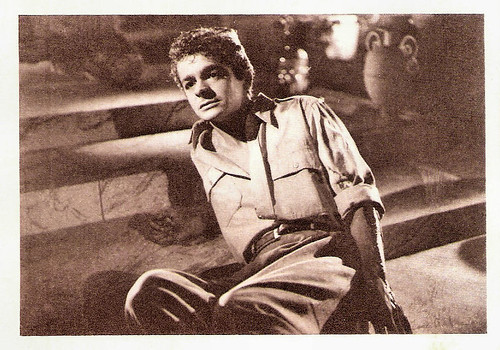
French collector card. Photo: publicity still for Les amants de Vérone / The Lovers of Verona (André Cayatte, 1949).
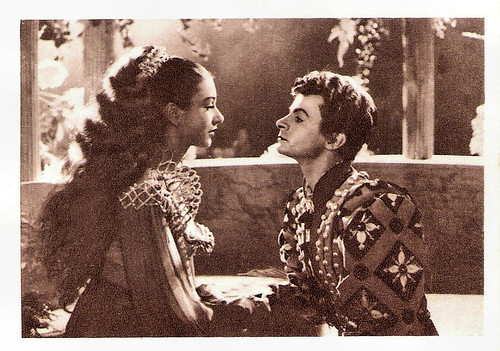
French collector card. Photo: publicity still for Les amants de Vérone / The Lovers of Verona (André Cayatte, 1949) with Anouk Aimée.

French collector card. Photo: publicity still for Les amants de Vérone / The Lovers of Verona (André Cayatte, 1949) with Anouk Aimée.
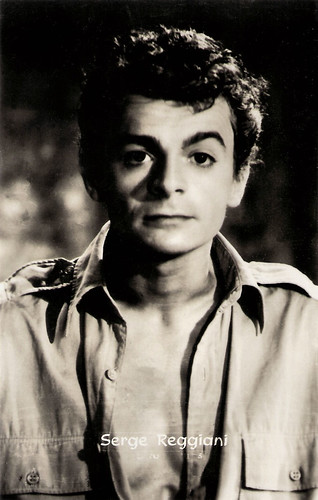
French postcard.
After a promising start, Serge Reggiani had never quite reached the peak of his acting career. In 1959, he seemed to have found his true vocation when he introduced a distinctive singing talent on the radio. That same year, he also had a triumph in the theatre with his performance in Jean-Paul Sartre’s play Les Séquestrés d'Altona.
In the cinema, he was busy with two more classics: the thriller Le doulos (Jean-Pierre Melville, 1962) starring Jean-Paul Belmondo, and the historical epic Il gattopardo / The Leopard (Luchino Visconti, 1963) starring Burt Lancaster and Alain Delon.
But in 1965, he finally could launch a musical career with the help of Simone Signoret and her husband, Yves Montand and later with the great assistance of the French diva Barbara. At the age of 43, he released his award-winning debut album, and it proved to be such a major hit with both the French public and the critics that singing became his prime career.
As an actor, he knew how to ‘perform’ a song, provoking sometimes laughter but mainly emotion. The deep-voiced Reggiani became one of the most acclaimed performers of French chanson, and although he was in his 40s, his bad-boy, rugged image made him popular with both young and older listeners. A second album produced in 1967, plus a left-wing concert with Jacques Brel, cemented his popularity with the younger politically left generation of the late 1960s.
He began to extend himself internationally while continuing a healthy album output. Reggiani’s best-known songs include 'Les loups sont entrés dans Paris' (The Wolves Have Entered Paris) and 'Sarah (La femme qui est dans mon lit)' (The Woman Who Is In My Bed), the latter written by Georges Moustaki. One of his regular songwriters throughout his career was Boris Vian ('Le Déserteur', 'Arthur où t'as mis le corps', 'La Java des bombes atomiques'). His new young fans identified with his left-wing ideals and anti-militarism, most notably during the 1968 student revolts in France.

French postcard by Editions du Globe, Paris, no. 105. Photo: Studio Harcourt.
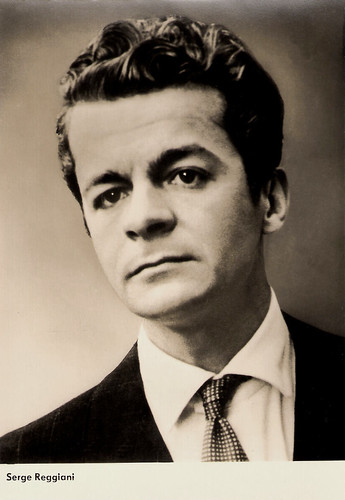
East German postcard by VEB Progress Filmvertrieb, Berlin, no. 1457.
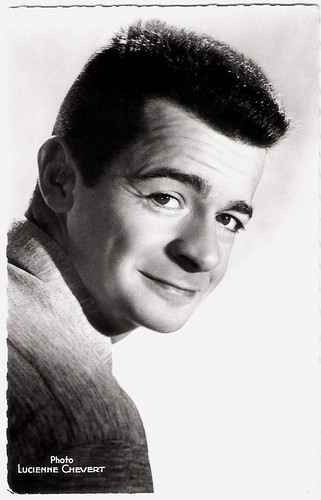
French postcard by Editions du Globe, Paris, no. 465. Photo: Lucienne Chevert.
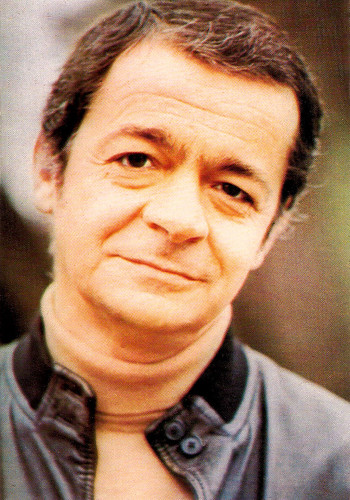
French card, no. 10.
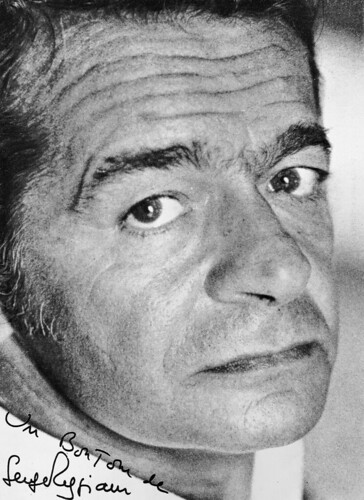
French postcard by La Roue Tourne, Paris.
During the 1970s Serge Reggiani played supporting parts in several interesting films, such as Touche pas à la femme blanche / Don’t Touch the White Woman (Marco Ferreri, 1974) featuring Catherine Deneuve, Vincent, François, Paul... et les autres / Vincent, François, Paul... and the Others (Claude Sautet, 1974) with Yves Montand, and La terrazza / The Terrace (Ettore Scola, 1980) with Vittorio Gassman.
With age, Reggiani became more and more acclaimed as one of the best interpreters of the French chanson, also bringing the poetry of Rimbaud, Apollinaire and Prévert closer to his audience. Children Stephan and Carine actively developed their own singing careers, and Reggiani performed on the concert stage with them in encouragement, but with lacklustre results. Son Stephan, completely overshadowed by his father, took this extremely hard and, in 1980, committed suicide at the family home in Mougins. He was only 33.
Devastated, Reggiani withdrew from the music scene for a while to recover from his grief. For many years, he struggled with depression and alcoholism. Divorced from his second wife in 1973, he met actress Noëlle Adam in the 1980s, and they lived in partnership for over 20 years, she becoming a lasting source of strength for him in dealing with his personal tragedies.
In 1985, the French government paid tribute to Reggiani's singing and acting careers with the prestigious Legion of Honour award. His later years would be more or less spent in seclusion, finding one last passion in painting. He displayed his works at his first exhibition in 1989. After performing in concert to mark the 25th anniversary of his singing career, Reggiani found the strength to return to the French music scene. In 1995, at age 70+, he successfully recorded and was welcomed back to the concert stage with great applause. Though his acting career had calmed down a great deal, he did star in De force avec d'autres/Forced To Be With Others (1993), a film written and directed by his son Simon Reggiani that also featured Noëlle Adam. In 1998, he appeared in his final feature film El pianist / The Pianist (Mario Gas, 1998).
Reggiani and Adam married in 2003. His last concert was held as late as the year of his death, in the spring of 2004. Serge Reggiani died at his Paris home of a heart attack at the age of 82. All of Reggiani's children inherited their father's artistic talents and have worked in the field of entertainment. Son Simon is a well-known director/writer/actor; daughters Carine and Celia work in music (the former is a singer-turned songwriter, the latter a musician); daughter Maria is a film editor; and grandson Nicolas has followed in the family footsteps as well. He launched a career as a singer performing songs covered by his late father, Stephan, Serge's oldest son.

French postcard by Editions La Malibran, Paris / Saint-Dié, no. CF 4. Photo: R. Le Febvre. Simone Signoret and Serge Reggiani in Casque d'Or (Jacques Becker, 1952).
Scene from Casque d'Or (Jacques Becker, 1952). Source: Little Ice Age (YouTube).

Italian photo by G.B. Poletto. Serge Reggiani and Burt Lancaster in Il Gattopardo / The Leopard (Luchino Visconti, 1963). Collection: Ivo Blom.
Trailer for Il Gattopardo (1963). Source: Blondinka Inoz (YouTube).
Sources: Gary Brumburgh (IMDb), Wikipedia, and IMDb.

French postcard by S.E.R.P., Paris, no. 198. Photo: Studio Harcourt.

French postcard by A.N., Paris, no. 1293. Photo: Raymond Voinquel.

French postcard by Editions O.P., Paris, no. 142. Photo: Teddy Piaz.

French postcard by Editions P.I., Paris, no. 5, presented by Biscuits Chocolats Victoria, Bruxelles. Photo: Pathé Cinema.

French postcard by Editions P.I., Paris, no. 360. Photo: Sam Lévin.
Revelation
Sergio Reggiani was born in Reggio Emilia, a town in northern Italy, in 1922. His father, a highly visible anti-fascist, fled his Mussolini-dictated homeland due to his fervent political activities and to protect his family. Serge moved to France with his parents at the age of eight. He learned to speak fluent French and developed an interest in athletics, particularly boxing, but went an entirely different route altogether by following in his father's footsteps as a hair stylist.
In 1937, Reggiani's career path changed yet again when he was accepted into the Conservatoire des Arts Cinematographiques. After graduation, he landed a few minor roles in both films and theatre and enrolled at the prestigious Conservatoire National d'Art Dramatique in 1939, where he won several acting awards. He was discovered by Jean Cocteau and appeared in a wartime production of 'Les Parents terribles' (The Terrible Parents). In the cinema, he made a remarkable debut in Voyageur De La Toussaint / Traveller of The Toussaint (Louis Daquin, 1943) with Jean Desailly. His next film was Le carrefour des enfants perdus / Children of Chaos (Léo Joannon, 1944).
DB Dumonteil writes at IMDb: “The movie was another Serge Reggiani's tour de force after his brilliant debut in Daquin's Voyageur De La Toussaint. Even if Feuillade's Wunderkind René Dary is the star of the film - and he is quite effective as a demobilised officer (and an ex-boarder of Belle Ile) -, Reggiani steals every scene. He is predating the rebels without a cause who would appear in the American cinema of the fifties. His not-so-good-looking face, his sunken features in spite of his young age, his rebellious swagger made him the revelation of those dark years, because he looked the part so much.”
During the filming of Le carrefour des enfants perdus, he met and subsequently married actress Janine Darcey. They had two children: Stephan (1946) and Carine (1951). During World War II, he left Paris to join the French resistance. Though he earned a reputation for himself in the Paris theatre world, Reggiani was more interested in filmmaking and would thereafter focus his attention on the big screen.
He starred in the classic Les portes de la nuit / The Gates of the Night (Marcel Carné, 1946). After obtaining French citizenship in 1948, he went on to secure a name for himself in the French cinema with roles in Manon (Henri-Georges Clouzot, 1949) with Cécile Aubry, Les amants de Vérone / The Lovers of Verona (André Cayatte, 1949) opposite Anouk Aimée, La ronde (Max Ophüls, 1950) and Casque d'or (Jacques Becker, 1952) featuring Simone Signoret, who became a close friend. Following his divorce from Janine Darcey, he married actress Annie Noël in 1958, and they had three children: Celia (1958), Simon (1961) and Maria (1963).

Belgian collector card by Merbotex, Bruxelles / Kursaal, Bertrix, no. 34. Photo: Vainquel.

French collector card. Photo: publicity still for Les amants de Vérone / The Lovers of Verona (André Cayatte, 1949).

French collector card. Photo: publicity still for Les amants de Vérone / The Lovers of Verona (André Cayatte, 1949) with Anouk Aimée.

French collector card. Photo: publicity still for Les amants de Vérone / The Lovers of Verona (André Cayatte, 1949) with Anouk Aimée.

French postcard.
True vocation
After a promising start, Serge Reggiani had never quite reached the peak of his acting career. In 1959, he seemed to have found his true vocation when he introduced a distinctive singing talent on the radio. That same year, he also had a triumph in the theatre with his performance in Jean-Paul Sartre’s play Les Séquestrés d'Altona.
In the cinema, he was busy with two more classics: the thriller Le doulos (Jean-Pierre Melville, 1962) starring Jean-Paul Belmondo, and the historical epic Il gattopardo / The Leopard (Luchino Visconti, 1963) starring Burt Lancaster and Alain Delon.
But in 1965, he finally could launch a musical career with the help of Simone Signoret and her husband, Yves Montand and later with the great assistance of the French diva Barbara. At the age of 43, he released his award-winning debut album, and it proved to be such a major hit with both the French public and the critics that singing became his prime career.
As an actor, he knew how to ‘perform’ a song, provoking sometimes laughter but mainly emotion. The deep-voiced Reggiani became one of the most acclaimed performers of French chanson, and although he was in his 40s, his bad-boy, rugged image made him popular with both young and older listeners. A second album produced in 1967, plus a left-wing concert with Jacques Brel, cemented his popularity with the younger politically left generation of the late 1960s.
He began to extend himself internationally while continuing a healthy album output. Reggiani’s best-known songs include 'Les loups sont entrés dans Paris' (The Wolves Have Entered Paris) and 'Sarah (La femme qui est dans mon lit)' (The Woman Who Is In My Bed), the latter written by Georges Moustaki. One of his regular songwriters throughout his career was Boris Vian ('Le Déserteur', 'Arthur où t'as mis le corps', 'La Java des bombes atomiques'). His new young fans identified with his left-wing ideals and anti-militarism, most notably during the 1968 student revolts in France.

French postcard by Editions du Globe, Paris, no. 105. Photo: Studio Harcourt.

East German postcard by VEB Progress Filmvertrieb, Berlin, no. 1457.

French postcard by Editions du Globe, Paris, no. 465. Photo: Lucienne Chevert.

French card, no. 10.

French postcard by La Roue Tourne, Paris.
Depression and alcoholism
During the 1970s Serge Reggiani played supporting parts in several interesting films, such as Touche pas à la femme blanche / Don’t Touch the White Woman (Marco Ferreri, 1974) featuring Catherine Deneuve, Vincent, François, Paul... et les autres / Vincent, François, Paul... and the Others (Claude Sautet, 1974) with Yves Montand, and La terrazza / The Terrace (Ettore Scola, 1980) with Vittorio Gassman.
With age, Reggiani became more and more acclaimed as one of the best interpreters of the French chanson, also bringing the poetry of Rimbaud, Apollinaire and Prévert closer to his audience. Children Stephan and Carine actively developed their own singing careers, and Reggiani performed on the concert stage with them in encouragement, but with lacklustre results. Son Stephan, completely overshadowed by his father, took this extremely hard and, in 1980, committed suicide at the family home in Mougins. He was only 33.
Devastated, Reggiani withdrew from the music scene for a while to recover from his grief. For many years, he struggled with depression and alcoholism. Divorced from his second wife in 1973, he met actress Noëlle Adam in the 1980s, and they lived in partnership for over 20 years, she becoming a lasting source of strength for him in dealing with his personal tragedies.
In 1985, the French government paid tribute to Reggiani's singing and acting careers with the prestigious Legion of Honour award. His later years would be more or less spent in seclusion, finding one last passion in painting. He displayed his works at his first exhibition in 1989. After performing in concert to mark the 25th anniversary of his singing career, Reggiani found the strength to return to the French music scene. In 1995, at age 70+, he successfully recorded and was welcomed back to the concert stage with great applause. Though his acting career had calmed down a great deal, he did star in De force avec d'autres/Forced To Be With Others (1993), a film written and directed by his son Simon Reggiani that also featured Noëlle Adam. In 1998, he appeared in his final feature film El pianist / The Pianist (Mario Gas, 1998).
Reggiani and Adam married in 2003. His last concert was held as late as the year of his death, in the spring of 2004. Serge Reggiani died at his Paris home of a heart attack at the age of 82. All of Reggiani's children inherited their father's artistic talents and have worked in the field of entertainment. Son Simon is a well-known director/writer/actor; daughters Carine and Celia work in music (the former is a singer-turned songwriter, the latter a musician); daughter Maria is a film editor; and grandson Nicolas has followed in the family footsteps as well. He launched a career as a singer performing songs covered by his late father, Stephan, Serge's oldest son.

French postcard by Editions La Malibran, Paris / Saint-Dié, no. CF 4. Photo: R. Le Febvre. Simone Signoret and Serge Reggiani in Casque d'Or (Jacques Becker, 1952).
Scene from Casque d'Or (Jacques Becker, 1952). Source: Little Ice Age (YouTube).

Italian photo by G.B. Poletto. Serge Reggiani and Burt Lancaster in Il Gattopardo / The Leopard (Luchino Visconti, 1963). Collection: Ivo Blom.
Trailer for Il Gattopardo (1963). Source: Blondinka Inoz (YouTube).
Sources: Gary Brumburgh (IMDb), Wikipedia, and IMDb.
No comments:
Post a Comment